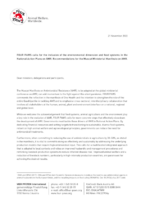
Sustainable Food Systems crucial to Tackle Antimicrobial Resistance
FOUR PAWS recommendations for the Muscat Ministerial Manifesto on AMR
24-25 November 2022 – Ministers from around the world are meeting in Muscat, Oman, to discuss vital steps to tackle antimicrobial resistance (AMR). As intensive farming plays a crucial role in the development of AMR, FOUR PAWS calls for improving animal welfare, reducing the number of animals farmed and transitioning to sustainable, diverse food systems to protect animals, humans and our environment.
Antimicrobial resistance (AMR) is one of the greatest threats to human health, causing globally 1.27 million deaths each year. AMR occurs when pathogens, such as bacteria and viruses, no longer respond to existing medicines. The more antimicrobials are used, the faster AMR develops. Intensive agriculture, accounting globally for over 70% of the use of antimicrobials is one of the leading causes of AMR, and it is recognised by experts and policymakers as a critical area of intervention to address this threat to public health

On intensive farms, antimicrobials are routinely administered to keep animals alive in conditions where disease spreads easily. Overcrowding, indoor confinement and mutilations are only some of the factors that make animals sick. Furthermore, the high-performance breeds in intensive systems are particularly susceptible to illness.
The solutions are clear. Improving animal welfare reduces the likelihood of injuries, lowers stress and ensures that the animals are in good health and their immune systems are strong, making them less prone to infections that require antimicrobial treatment. Fostering genetic diversity in farming is a key factor in improving animal health. Reducing the number of animals farmed, particularly in countries with high-intensity production, is the other, indispensable, part of the answer to the AMR threat.
As policymakers meet at the third global high-level ministerial conference on AMR, FOUR PAWS published an open letter and shared recommendations, aimed at enshrining in the Muscat Ministerial Manifesto on AMR (the outcome of their meeting) the commitment to transition to sustainable, diverse and balanced food systems built around high animal welfare and agroecological principles to reduce the reliance on antimicrobial input. You can read our open letter below.


